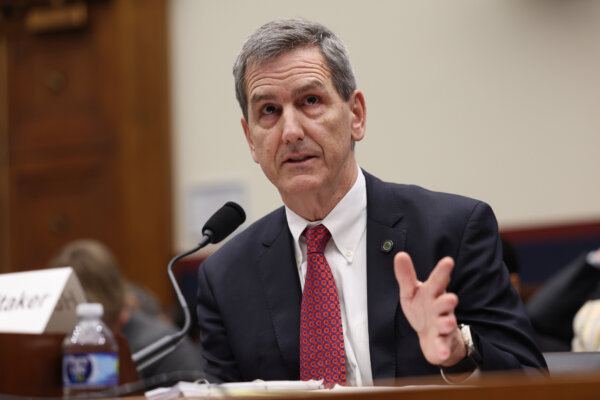
The administrator said the Jan. 5 Alaska Airlines incident initiated a ‘fundamental shift’ in Boeing’s safety culture.
Michael Whitaker, the administrator for the Federal Aviation Administration (FAA), testified to the U.S. Senate on June 13 about Boeing’s implementation of the FAA’s 90-day safety plan, suggesting the agency was too “hands-off” with the company prior to a January midair incident that triggered further scrutiny.
Mr. Whitaker appeared before the Senate Committee on Commerce, Science, and Transportation to discuss the FAA’s oversight of Boeing’s aviation manufacturing following the Jan. 5 Alaska Airlines incident when a door panel blew off a 737 Max 9 shortly after takeoff.
As a result of the incident, the FAA in February capped production levels on the 737 Max and gave Boeing 90 days to submit a comprehensive safety plan to the agency to ensure manufacturing quality control and prevent further mishaps.
Mr. Whitaker said the production caps remain, Boeing is still producing jets well below the caps, and he does not expect the company to reach a level of compliance in the short term to remove the caps.
The administrator acknowledged that the FAA should have had “much better visibility into what was happening at Boeing before January 5.”
“The FAA’s approach was too hands-off, too focused on paperwork audits, and not focused enough on inspections,” Mr. Whitaker said.
He said the agency has changed its approach over the past several months and that those changes are permanent, including an “audit-plus-inspection approach” to gain better insight into the company’s operations.
“I will personally remain engaged to ensure Boeing executes the necessary changes to transform its safety culture and address its production quality issues,” Mr. Whitaker said.
During opening remarks, Sen. Maria Cantwell (D-Wash.) noted that Mr. Whitaker had identified 97 instances at Boeing “where products did not meet FAA standards.”
She said the FAA instituted the 90-day plan for Boeing to “reform its production quality” but expressed concern that it may not mark the sea change in quality control the company needs in order to regain its public reputation.
“I’m struck by a sense of ‘Is this déjà vu? Are we just back here?’ Or can we have a new day in creating a safety culture that is so critical for the United States to be the leader in manufacturing?” Ms. Cantwell asked.
Sen. Ted Cruz (R-Texas) also remained skeptical of Boeing’s intentions regarding the FAA’s suggested safety reforms and the agency’s previous oversight of the aerospace company.
“I was very glad to see that the FAA took swift action to ground the 737 Max after the [Jan. 5] accident. However, I remain concerned that the FAA’s oversight of Boeing failed to spot serious production gaps,” he said.
“The FAA must guarantee that not only are they certifying that an aircraft is safely designed, but that the manufacturer is building them to that safe design. Clearly, that was not always happening at Boeing.”
This is a developing story.










